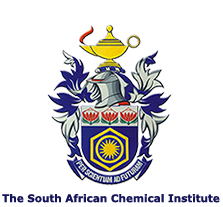Commonwealth Chemistry Congress (CCC2025) 11-14 May 2025
Speakers
Zero Hunger (SDG 2), Good Health and Well-being (SDG 3)
Plenary |
||
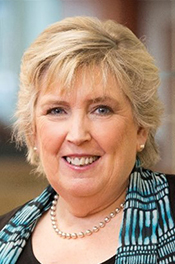 |
|
|
Prof Margaret Brimble |
|
Prof Mark Wuddivira |
Margaret is a Distinguished Professor and Director of Medicinal Chemistry at the University of Auckland, New Zealand. She is an Executive Editor for Organic Letters, Deputy Director of the Maurice Wilkins Centre for Molecular Biodiscovery, Past-President of IUPAC Organic and Biomolecular Division III and Past-President of the International Society of Heterocyclic Chemistry. She has published >580 papers, 100 reviews and is an inventor on >50 patents. She is a Fellow of the Royal Society London, Dame Companion of the New Zealand Order of Merit and was inducted into the American Chemical Society Medicinal Chemistry Hall of Fame. She was awarded the 2023 Davy Medal from the Royal Society London, Rutherford, Hector and MacDiarmid medals (Royal Society NZ), 2022 Royal Society of Chemistry Pedler Award for innovation in Organic Chemistry and the 2023 American Chemical Society Ernest Guenther award for Natural Products Chemistry. She was also named the 2007 L’Oreal-UNESCO Women in Science laureate in Materials Science for Asia-Pacific and a 2015 IUPAC Distinguished Women in Chemistry/Chemical Engineering. Margaret’s research focusses on the synthesis of novel bioactive natural products, antimicrobial and antiviral peptides, antibody-drug conjugates, lipopeptides/glycopeptides for vaccines and new biomaterials. Her lab carried out the medicinal chemistry programme that led to the discovery of the drug Trofinetide (NNZ2566) that gained FDA approval (marketed as DaybueTM) in March 2023 for the treatment of Rett Syndrome (http://www.neurenpharma.com; https://acadia.com). Her team also carried out the medicinal chemistry for the investigational new drug candidate NNZ2591 that is currently in phase 2 clinical trials for four neurogenetic disorders: Angelman syndrome, Pitt Hopkins syndrome, Phelan-McDermid syndrome and Prader-Willi syndrome. |
Professor Mark Wuddivira is the Dean of the Faculty of Food and Agriculture at The University of the West Indies (UWI), St. Augustine, and a Professor of Agri-Environmental Soil Physics. He also serves as the President and a Fellow of the Caribbean Academy of Sciences (CAS) and is a member of the International Science Council's (ISC) Small Island Developing States (SIDS) Liaison Committee. An internationally recognized expert in agricultural and environmental sciences, Professor Wuddivira’s research focuses on soil physical management and the sustainable use of humid tropical ecosystems. His work has been widely published in leading international journals, and he is frequently invited to deliver keynote speeches and expert presentations at high-level UN, ISC, Latin America, and Caribbean meetings. In addition to his ongoing academic contributions, he has also served as a Visiting Lecturer/Researcher at top international institutions, with his longest tenure being from May 2018 to May 2019 at the Faculty of Natural and Environmental Sciences, University of Koblenz-Landau, Germany. Professor Wuddivira has played a pivotal role in advancing a comprehensive interdisciplinary research programme that integrates plant and soil science, driving innovation and research dissemination both regionally and internationally. In recognition of his significant contributions, he was awarded the Principal’s Research Award as the Most Outstanding Faculty Researcher in 2023. A leading figure in the academic and scientific communities, particularly in advancing science, technology, and innovation for sustainable development in SIDS, Professor Wuddivira champions the transformation of the agri-food system to ensure food security and resilient development for these vulnerable regions. He holds a Ph.D. in Soil Science and a Graduate Certificate in University Teaching and Learning from UWI, as well as a BSc in Agriculture and an MSc in Soil Science from Ahmadu Bello University, Nigeria. He also earned an International Graduate Certification from the Hebrew University of Jerusalem, Israel. In addition to his academic and research roles, Professor Wuddivira chairs the Editorial Board of the journal Tropical Agriculture and is an Associate Editor of the Journal of Plant Nutrition and Soil Science (Wiley). He serves on various steering committees and advisory boards, including the Caribbean WaterNet/CAPNET UNDP, the Cocoa Research Centre at UWI, and the Caribbean Agricultural Research and Development Institute (CARDI). He is also a member of the Advisory Council for the Transformation of Agri-Food Systems (CATSA) at the Inter-American Institute for Cooperation on Agriculture (IICA) and chairs the Consortium of Universities in the Caribbean Communities involved in Agricultural Education and Research (CUCAER). |
|
Keynote |
||
|
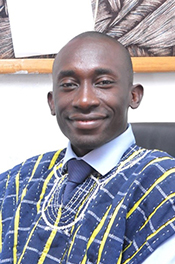 |
|
Prof Justus Kwetegyeka |
Dr Lawrence Sheringham Borquaye |
|
Born on July 12, 1962, in Uganda, earned my PhD from Makerere University, where I also completed a Master of Science in Chemistry and a Bachelor of Education. My educational background includes additional qualifications from the University of Bristol, in both science and education. With over thirty years in academia, I began as a Teaching Assistant, advanced through various academic promotions, becoming an Associate Professor in the Department of Chemistry at Kyambogo University and where I am currently serving as the Deputy Vice Chancellor for Finance and Administration. I have made significant contributions to analytical chemistry and environmental science, focusing on environmental chemistry. . My published work appears in reputable international journals, covering topics such as polycyclic aromatic hydrocarbons, fatty acid profiles, and the impact of environmental contaminants on health. In addition I have supervised numerous graduate students and played a key role in academic and policy development at Kyambogo University. My involvement in thesis examinations and defenses at various institutions underscores my expertise and commitment to advancing knowledge in field of chemistry and education. Beyond my university roles, I serve on the National Multi-Sectoral Technical Committee for chemical management and chaired UNESCO's International Basic Science Programme. Passionate about science education, I engage in outreach programmes to inspire young scholars in STEM education. My hobbies include reading scientific literature and participating in academic conferences, reflecting my dedication to continuous learning and research advancement. |
Lawrence Sheringham Borquaye earned his B.Sc. in Chemistry from the University of Cape Coast, Ghana, in 2006, where he researched the mosquito repellency properties of Hyptis suaveolens leaves under Prof. Victor Y. Atsu-Barko. He completed his Ph.D. in Chemistry at the University of Massachusetts Amherst, USA, in 2013, under Professor Nathan A. Schnarr, focusing on developing tools to engineer polyketide synthases (PKSs)—the biosynthetic machinery for assembling polyketides. After his Ph.D., Lawrence returned to Ghana and joined the Department of Chemistry at Kwame Nkrumah University of Science and Technology (KNUST) as a lecturer. He was promoted to Senior Lecturer in 2018 and currently serves as the Assistant Laboratory Manager of the KNUST Central Laboratory, which houses advanced analytical instruments for research. In 2023, he was appointed Beidenharn Distinguished Visiting Associate Professor at the prestigious Wellesley College, USA. Lawrence’s research, supported by grants from the International Foundation for Science (IFS), The World Academy of Sciences (TWAS), and DANIDA, explores the interface of chemistry and biology. His work spans Natural Products, Biomolecular Computations, and Environmental Chemistry. The Borquaye Research Group, which includes undergraduate, master's, and doctoral students, currently comprises about 70 members and has produced approximately 60 peer-reviewed publications. |
|
|
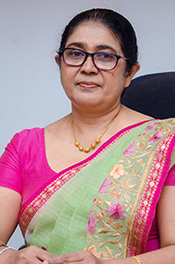 |
|
Prof Helen Hailes |
Prof Priyani Paranagama |
|
Helen received her Ph.D in 1991 at the University of Cambridge, working on polyketide biosynthesis under the supervision of Professor Jim Staunton. She pursued post-doctoral work at Cambridge, and then at Imperial College London with Professor Steve Ley and subsequently with Dr David Widdowson. She joined the Department of Chemistry, University College London as a Lecturer in 1994, becoming a Senior Lecturer in 2002, a Reader in 2005, and Professor of Chemical Biology in 2010. In 2023 she became the Alexander Williamson Professor of Chemistry. |
Professor Priyani Paranagama is the Chair of Chemistry at the University of Kelaniya, Sri Lanka, and the Former Director of the Institute of Indigenous Medicine, University of Colombo (February 2018 – February 2023). |
|
Affordable and Clean Energy (SDG 7), Responsible Consumption and Production (SDG 12)
Plenary |
||
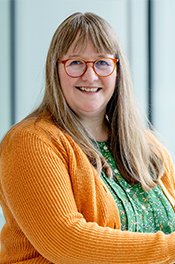 |
||
Prof Fran Kerton |
|
Prof John Irvine |
Francesca Kerton is a professor of Green Chemistry at Memorial University of Newfoundland, Canada and has a global reputation for her innovative research on sustainable chemistry related to the oceans. She currently chairs the International Union of Pure and Applied Chemistry’s standing committee on Chemical Research Applied to World Needs (CHEMRAWN). She is an Associate Editor for the journal RSC Sustainability and an Advisory Board member for Reaction Chemistry & Engineering. She recently chaired the 27th Annual Green Chemistry & Engineering Conference and will chair the 2027 IUPAC World Chemistry Congress and General Assembly, which will be held in Canada. She received the 2019 Canadian Green Chemistry and Engineering Award, the 2023 SCI-Canada Kalev Pugi Award for exceptional achievements in research and development. More recently she was recognized as one of 3M’s 25 Women in Science – 2024’s program focused on environmental sustainability. Upon arriving in Newfoundland in 2005, her experiences in the field of renewable chemicals led her to question whether there were overlooked feedstocks available in the oceans that could solve the debate of ‘food vs. fuel’ or reduce waste streams associated with seafood production. She is a member of the established Atlantic Canada Environmental and Sustainable Chemistry Centre and collaborates with local companies and the NRC (National Research Council Canada) on ocean bioeconomy related research. She also performs research in the area of carbon dioxide utilization and is part of an NSERC-funded training network “Centre for Innovation and Research on Carbon Dioxide Utilization in Industrial Technologies”. |
John Irvine CBE, FRSE, FRSC has made unique and world-leading contributions to the science of energy materials, especially fuel cell and energy conversion technologies. This research has ranged from detailed fundamental to strategic and applied science and has had major impact across academia, industry and government. Irvine’s science is highly interdisciplinary extending from chemistry and materials through physics, bioenergy, geoscience, engineering, economics and policy. |
|
Keynote |
||
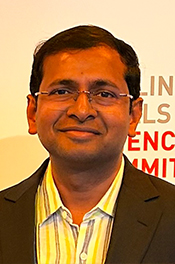 |
|
|
Prof Vivek Polshettiwar |
Prof Hwei Voon Lee |
|
Prof. Vivek Polshettiwar research interests are within the domain of advanced nanomaterials and nanocatalysis for harvesting solar energy and the transformation of carbon dioxide into value-added chemicals and fuels. The work of his group in the nanocatalysis realms of "Black Gold" and “Defects” chemistry represents a quintessential example of how fundamental science can drive innovation in applied research. His group's detailed exploration of plasmonic photocatalysis and defect engineering offers new perspectives on material design, catalysis, and sustainability, paving the way for future research that continues to explore the vast potential of nanomaterials in solving some of the world's most pressing environmental and energy challenges. He has published nearly 120 articles with an h-index 65 and around 17700 citations in reputed journals. He also filed 12 national and international patent/patent applications. He is the recipient of the prestigious ORISE Research Fellowship at US-EPA. He also received an Asian Rising Star lectureship at 15th Asian Chemical Congress (ACC), Singapore (2013), from Nobel Laureate Professor Ei-ichi Negishi. In 2015, he was admitted as a Fellow of the Royal Society of Chemistry (RSC), United Kingdom. He was awarded a Bronze medal by the Chemical Research Society of India (CRSI), India. He was awarded the prestigious Materials Research Society of India - MRSI Medal 2019. In 2021, he was elected as a Fellow National Academy of Sciences, India (NASI). He received the 2022 IUPAC-CHEMRAWN VII prize for green chemistry from IUPAC. In 2023, he received the Falling Walls Award in Physical Sciences. In 2024, he was elected as a Fellow Indian Academy of Sciences. |
Associate Professor Dr. Lee Hwei Voon works at the Nanotechnology and Catalysis Research Centre, University of Malaya in Malaysia. She completed her undergraduate degree in Industrial Chemistry in 2008 and her doctorate in Catalysis in 2012, both from Universiti Putra Malaysia (UPM). Her area of expertise lies in nanotechnology and catalysis. Dr. Lee's research focuses on catalytic conversion technology of biomass and organic waste chemistry, encompassing the study of catalyst design and synthesis (including mixed metal oxide-based, carbon-based, and waste material-based catalysts). Her work has applications in biofuels (biodiesel, renewable diesel, refuse-derived fuels), biochemicals (bio-oil derived hydrocarbons), and bio-nanomaterials (such as nanocellulose). Lee’s research has been featured in over 100 peer-reviewed, top-tier international journals, accumulating 5061 citations and achieving h-index of 40. Currently, Lee is supervising 33 postgraduate students (15 PhD and 18 MSc) who are involved in these relevant projects. Her research contributions have been acknowledged through various accolades, including the Excellence Service Award from the University of Malaya in 2021. Additionally, she has garnered several esteemed innovation and invention honors, notably being consistently ranked among the World's Top 2% Scientists by Stanford University from 2020 to the present (2024), as well as Asian Universities Alliance (AUA) Scholars Award (2020). |
|
|
|
|
Prof Veikko Uahengo |
Prof Nasim Amiralian |
|
Veikko received his Ph. D in Chemistry at the Wuhan University, China, in 2013, after spending close to ten years pursuing MSc and Ph. D in Chemistry, while under the Staff Development Fellowship programme of the University of Namibia (UNAM). Upon completing his Ph. D, he returned back and rejoined the Department of Chemistry and Biochemistry, UNAM. He was appointed as HoD of Chemistry and Biochemistry in 2014, until 2017, the same year promoted to senior lecturer. In 2017, he was appointed as the Deputy Dean, Faculty of Science, the role he served until 2019. In 2020, after the restructuring process, he became the first Associate Dean of the School of Science, the role he is serving up to date. In 2020, he was promoted to Associate Professor position until March 2024, before he was finally promoted to a Full Professor position in May 2024. Additionally, he has been actively involved in research project collaboration with both local and international partners. He was a co-principal investigator in the 5 universities consortium project (CU, UB, BIUST, KNUST, UNAM) with Royal Society – DFID Capacity building programme, 2016-2021, giving birth to Chem4Energy Consortium. He is currently a co-principal investigator in a SASSCAL Funded Project – Green Hydrogen Project for Daures Villages, 2023 – 2025. While pursuing Ph. D, his main research focus was on the photocatalytic water splitting for hydrogen production. The studies exploited the parameters such as antenna effects and judicious molecular engineering of ruthenium compounds. His studies were particularly focused on understanding and harnessing charge transfer mechanisms (MLCT, MMCT, LMCT, etc.). In addition to the dye sensitizers for solar cells, lately his focus is on catalytic systems based on composite metal oxides employing biosynthesis methods for applications in water splitting for GH2, degradation of organic matters for water treatment, biological activities and conversion of CO2 into other useful components such as CO and Urea. |
Dr Nasim Amiralian is the Leader of the Bio-inspired Materials research group at The University of Queensland. Her research mission is to repurpose and transform agricultural waste into a commercial and sustainable product to tackle the global plastic issue. She partners with industry, First Nations people, community, and farmers to address these challenges collaboratively and transform agricultural waste into diversified, environmentally, and financially valuable resources. |
|
Clean Water and Sanitation (SDG 6), Climate Action (SDG 13)
Plenary |
||
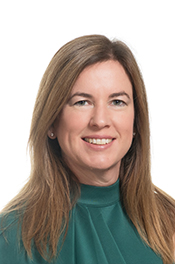 |
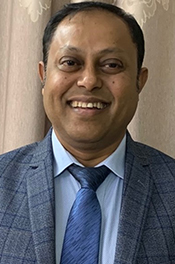 |
|
Prof Patricia Forbes |
|
Prof Abdus Salam |
Patricia Forbes is a Full Professor in Analytical Chemistry at the University of Pretoria and holds the Rand Water Chemistry Research Chair. She leads the Environmental Monitoring and Sensing research group which focuses on the development of novel sampling and analytical methods for environmental pollutants, including polycyclic aromatic hydrocarbons, pesticides, mercury and emerging chemical pollutants. Patricia was previously Environmental Manager at Impala Platinum Refineries and Head of the Air Quality Research Laboratory of the Council for Scientific and Industrial Research. Prof Forbes is a Fellow of both the South African Chemical Institute and the Royal Society of Chemistry (RSC). She was an elected member on the Professional Standards Board of the RSC and is currently the International Local Section Representative on the RSC Member Networks Committee, as well as Chairperson of the RSC Local Section South Africa, North Committee. Prof Forbes is the Deputy Chair of the Professional Advisory Committee for Chemical Science of the South African Council for Natural Scientific Professions (SACNASP) and she is appointed as the International Union of Pure and Applied Chemistry (IUPAC) National Representative for Analytical Chemistry. Prof Forbes is Editor of Environmental Toxicology and Chemistry, Editorial Board member of Chemosphere; Applied Science; and Sustainable Chemistry for Climate Action, and Guest Editor for Trends in Analytical Chemistry. She serves as an expert to the South African Bureau of Standards and the International Organization for Standardization (ISO), as well as to the Minister of the Department of Forestry, Fisheries and the Environment of South Africa. |
|
Professor Abdus Salam completed his Bachelor of Science (BSc) in Chemistry and Master of Science (MSc) in Physical-Inorganic Chemistry from University of Dhaka, Bangladesh. He did his PhD on Atmospheric Analytical Chemistry in Technical University of Vienna, Austria. He worked as a Postdoctoral Fellow at Dalhousie University, Halifax and York University, Canada. Currently he is a Full Professor in the Department of Chemistry, and also Dean of Faculty of Science, University of Dhaka. His research interests are on atmospheric chemistry, urban air quality and impacts on human health, climate change and Ecosystem (connected to SDGs Goals number 3. Good Health and Wellbeing, 11. Sustainable Cities and Communities, and 13. Climate Action) He is the Principal Investigator of two atmospheric science research observatories (Urban Dhaka and coastal Bhola Island) in Bangladesh. He has been collaborating with NASA, USA; Stockholm University, Sweden; Dalhousie University, Canada; University of Washington at St. Louis; University of Wisconsin; Duke University, USA; Shibaura Institute of Technology, Japan; Academia Sinica, Taiwan; University of Bristol, UK; Center of Research for Environment Energy and Water, Nepal. He has been organizing many national and international workshops and conferences in home and aboard. He has been actively participating in electronic and print media's interview/talk show on air pollution: causes, impacts and mitigations. He has been serving in various international committees including International Global Atmospheric Chemistry (IGAC) as a Co-Chair, and also Global Health Oversight Committee member of Health Effects Institute (HEI). |
Keynote |
||
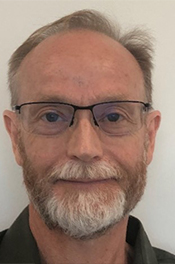 |
|
|
Prof Richard Webster |
Ms Preshanthie Naicker |
|
Richard Webster has been in the Chemistry faculty at Nanyang Technological University (NTU) since 2006. He received his B.Sc. degree (1990) in Chemistry/Geology from the University of Auckland (New Zealand), and B.Sc. (Hon.) (1993) and PhD degrees (1997) in Chemistry from La Trobe University (Melbourne, Australia). After finishing his PhD, Dr Webster received a Ramsay Memorial Fellowship and conducted postdoctoral research in the Physical and Theoretical Chemistry Laboratory at the University of Oxford (1996-1998). Immediately prior to joining NTU, he worked as a Queen Elizabeth II Fellow in the Research School of Chemistry at the Australian National University (1999-2006). |
Ms Naicker is a natural thought-leader, strategic enabler and respected multi-skilled professional in the water, biodiversity and sustainability realm. Driven by passion, Ms Naicker’s career contributed to developmental impact through research and industry related action within the African region. In South Africa, she has provided a leading role for the Country’s preparation in the ratification of an International Treaty; supported the country to transition from environmental compliance to nature-based socio-economic development and subsequent implementation factoring climate change; conservation and sustainable use, global benefit-sharing, biotechnology, innovation, relevant governance models to grow an emerging economy. |
|
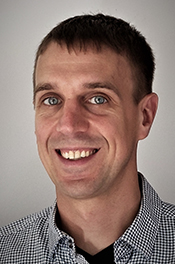 |
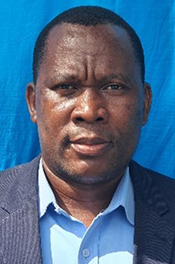 |
|
Prof Trevor VandenBoer |
Dr Kessy Fidel Kilulya |
|
Dr. Trevor VandenBoer is an Associate Professor in the Department of Chemistry at York University. His group’s research focuses on the atmospheric chemistry of reactive nitrogen species because emissions of reactive nitrogen have perturbed the global nitrogen cycle to unprecedented levels. These chemicals are introduced to the environment by human transportation, agricultural, cooking, cleaning, and industrial activities. VandenBoer develops and applies new methods to probe the impacts of reactive nitrogen on indoor and outdoor air quality and climate with an emphasis on the role of exchange at interfaces. He has been recognized for early career research excellence in the Faculty of Science at York in 2024, having attracted more than $2M in funding from diverse sources including: NSERC Discovery, RTI, Alliance; Environment and Climate Change Canada (ECCC); and Alfred P. Sloan Foundation. VandenBoer’s group has published over 30 peer-reviewed papers since 2017, with trainees leading or contributing to 20 of these. |
Dr. Kessy Fidel Kilulya is a Tanzanian Chemist, Academic and researcher, currently serving as a Senior lecturer at the Chemistry Department of the University of Dar es Salaam (UDSM), Tanzania, with a career spanning over two decades. Dr. Kilulya holds a PhD in Chemistry from the University of Johannesburg, South Africa, specializing in Analytical and Environmental Chemistry. He also earned his MSc in Chemistry, and BSc with Education, majoring in Chemistry and Mathematics, from the University of Dar es Salaam. |
|
Quality and Effective Education (SDG 4)
Plenary |
 |
Prof Hyleen Mariaye |
Preshanthie Naicker has 15 years experience within the environmental sustainability industry in developing and implementing environmental business best practice and strategies, environmental legislative and regulatory policies, advising and supporting operational sustainability, and leading national and international projects. She is currently employed at the DFFE as the Director for a UNDP/GEF 6 international project. Preshanthie’s portfolios have supported the Government in widespread implementation of the Convention on Biological Diversity and Nagoya Protocol on Access and Benefit-Sharing and have contributed to the implementation of the Kunming-Montreal Global Biodiversity |
Opening Session
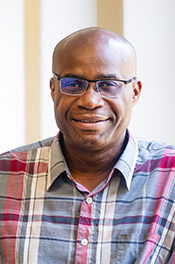 |
Prof Kelly Chibale |
Kelly Chibale is a Professor of Organic Chemistry at the University of Cape Town (UCT) where he holds the Neville Isdell Chair in African-centric Drug Discovery & Development. He is also a Schmidt Sciences AI2050 Senior Fellow, Full Member of the UCT Institute of Infectious Disease & Molecular Medicine, founding Director of the South African Medical Research Council Drug Discovery & Development Research unit at UCT, Founder & Director of the UCT Holistic Drug Discovery and Development Centre (H3D), and Founder & CEO of the H3D Foundation. Kelly obtained his PhD in Synthetic Organic Chemistry from the University of Cambridge (UK) with Stuart Warren. This was followed by postdoctoral stints at the University of Liverpool (UK) with Nick Greeves and at The Scripps Research Institute (USA) with K.C. Nicolaou. He was a Sandler Sabbatical Fellow at the University of California San Francisco (USA), a US Fulbright Senior Research Scholar at the University of Pennsylvania School of Medicine (USA), and a Visiting Professor at Pfizer (UK). Kelly’s research interests are in drug discovery and the development of tools and models to contribute to improving treatment outcomes in people of African descent. He serves as Editor-In-Chief of the American Chemical Society (ACS)’s ACS Medicinal Chemistry Letters. |
Panellists
Machine Learning and AI in the Chemical Sciences
Panellist |
|
Panellist |
|
|
|
Prof Kim Jelfs |
|
Dr Anshu Bhardwaj |
Prof. Kim Jelfs is a Professor of Computational Materials Chemistry in the Department of Chemistry at Imperial College. Her group specialises in the use of computer simulations and artificial intelligence to assist in the discovery of supramolecular materials, particularly porous materials and organic electronics, working closely with experimental collaborators. Kim was awarded a 2018 Royal Society of Chemistry Harrison-Meldola Memorial Prize, a 2019 Philip Leverhulme Prize in Chemistry, was the 2022 Blavatnik Awards Laureate in Chemistry and held an European Research Council Starting Grant. She is co-Director of the Institute for Digital Molecular Design and Fabrication at Imperial and an Associate Editor for Chemical Communications. She Co-Directs the UK’s AI for Chemistry hub (AIChemy) funded by the EPSRC. |
Anshu Bhardwaj obtained her Ph.D. in Life Sciences (2008) from Centre for Cellular and Molecular Biology, Hyderabad. The focus of her Ph.D. thesis was on prioritizing Single Nucleotide Polymorphism (SNPs) in disease association studies to identify potential biomarkers. As a lead PI in the Open Source Drug Discovery project, She conceived, designed and implemented crowdsourcing as a tool to tackle challenging scientific problems (Connect to Decode project), which is considered futuristic approach to drive big data scientific projects. Over years, Dr. Bhardwaj has published several prediction methods, databases and ontology based barcoding methods for genome variation data towards better understanding of genotype-phenotype correlations in addition to state-of-the-art interactome and reactome for Mycobacterium tuberculosis. She also writes popular science articles. She served as an Associate scientific advisor to Science Translational Medicine and is on the Editorial board of Frontiers in Systems Biology. She was selected as one of the young Innovator in India by UNDP and for International Visitor Leadership Program by US State Department. |
|
|
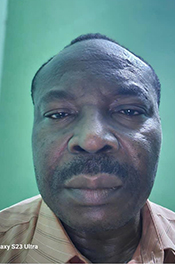 |
|
Mr Gregg Barrett |
Dr ObinnaOfoegbu |
|
Gregg Barrett is the CEO of Cirrus, Africa’s AI initiative. Gregg is a technology executive who builds and scales innovative operations at large private and public sector organisations, non-profits, and start-ups globally. Presently, his focus is on Africa’s three largest projects in women’s health, coffee manufacturing, and AI driven securities market making. |
Dr. Obinna Ofoegbu is a Nigerian research chemist and academic with over 20 years of experience in scientific research, lecturing, and project management. He specializes in polymer synthesis, nanomaterial fabrication, materials recycling, and molecular imprinting. He holds PhD, MSc, (Polymer Chemistry), and B.Tech (Industrial Chemistry). |
Gender Equality (SDG 5) and Reduced Inequalities (SDG 10)
Panellist |
|
Panellist |
|
|
|
Ms Nelcia Robinson |
|
Dr Yang Farina Abdul Aziz |
Woman on Fire for a cause |
ChM Dr. Yang Farina Abdul Aziz was a Professor of Inorganic Chemistry at Universiti Kebangsaan Malaysia (UKM). Apart from her scientific endeavours she was a member of a Think-Tank Group to advise the Ministry of Education on policy matters pertaining to academia and internationalisation. Currently Dr Yang Farina is retired from UKM. However, she remains active in Institut Kimia Malaysia and Akademi Sains Malaysia. She was elected as the Vice President of IKM for the term 2024/25. Dr Yang Farina was appointed as a Titular Member of Division II (Inorganic Chemistry) of the International Union of Pure and Applied Chemistry (IUPAC) for the period of 1 January 2024 to 31 December 2025. She is a Fellow of the Malaysian Academy of Sciences Malaysia (ASM). As a Fellow she has served as the Chairman of the National Science Challenge Steering Committee. Committee. She is also the Alternate Chairman to the Chemical Discipline in ASM. She is also an active member of ASM’s Water Committee. Dr Yang Farina is married and has a son Dr. Muhammad Haziman Mohamad Fauzi who is serving as a medical officer in The National Heart Institute. In her spare time, Dr Yang Farina loves walking, hiking, workout in the gymnasium, writes and debates in her Facebook and Instagram, and reads novels. |
|
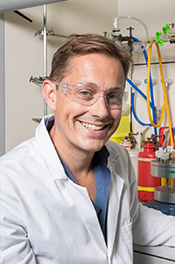 |
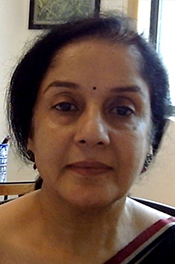 |
|
Prof Stephen Hilton |
Dr Shailja Gupta |
|
Dr. Stephen Hilton studied Chemistry with Management at King’s College London (BSc 1996) and completed his PhD in 2002 under the supervision of Professor Keith Jones at King’s College London and Kingston University. He then undertook postdoctoral research with Professor William Motherwell FRS at University College London (2002-2006) and at the Institute of Cancer Research, University of London (2006-2008). In 2008, he was awarded an RCUK fellowship at the School of Pharmacy, University of London, which later became the UCL School of Pharmacy, where he currently holds the position of Associate Professor.
|
Dr Shailja Gupta obtained her Ph.D. Degree and Post Doctorate experience from Indian Institute of Technology, Delhi and her Masters in Biochemistry from University of Poona. Government Experience: |
Transformation of the Commonwealth Chemical Industry (SDG 9)
Panellist |
|
Panellist |
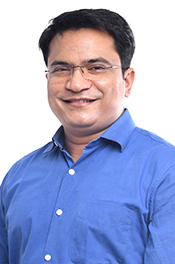 |
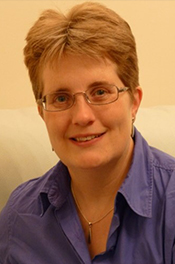 |
|
Dr Sandip Patil |
|
Prof Karen Wilson |
Dr. Sandip Patil is a Serial Entrepreneur, distinguished researcher and motivational speaker with extensive expertise in nanofiber processing technology, material chemistry and active nano membrane technology. Holding a PhD in Chemical Engineering from IIT Kanpur India, Dr. Patil has over 13 years of translational research experience, which has driven him to the forefront of nanotechnology innovation. His deep passion for this field led to the founding of E-Spin Nanotech Pvt. Ltd. in 2010, where he has spearheaded the development of cutting-edge technologies, including the widely acclaimed nanofiber-based reusable and antibacterial/antiviral SWASA-N95 facemasks—a critical innovation during the COVID-19 pandemic served 50 million people worldwide. Dr. Patil’s work is highly recognized, with numerous scientific publications and multiple national and international patents to his name. His research has garnered international attention, featured in outlets such as CNN U.S. Edition, Mint, and the Wall Street Journal. As a leading entrepreneur in nanotechnology, Dr. Patil has guided his company to achieve significant milestones, including the prestigious DSIR recognition. Beyond his entrepreneurial success, Dr. Patil actively contributes to academia as an advisor and Education Board Member at various institutions. He is also deeply committed to social activism, playing a key role in IIT Kanpur’s Unnat Bharat Abhiyan, an initiative focused on sustainable agriculture and rural development in India. |
|
Prof Karen Wilson is Professor of Catalysis at the Centre for Catalysis and Clean Energy at Griffith University, and previously held professorial positions at RMIT University (2018-23) and Aston University (2013-17). At Aston she was also Research Director of the European Bioenergy Research Institute and held a prestigious Royal Society Industry Fellowship in collaboration with Johnson Matthey. Karen holds a BA and PhD from the University of Cambridge, and MSc in heterogeneous catalysis from the University of Liverpool, and has also held academic positions at the University of York and Cardiff University. She has published >300 peer-reviewed articles (h-index 82, >25,000 citations Google Scholar). Karen’s research interests lie in the design the design of tunable porous materials for sustainable biofuels and chemicals production from renewable resources. Karen is Associate Editor of Sustainable Energy & Fuels (Royal Society of Chemistry), and Energy & Environmental Materials (Wiley) and Editorial Board member for Energy & Environmental Science (Royal Society of Chemistry). She is also a co-investigator and theme leader the Australian Research Council Centre of Excellence, ‘Green Electrochemical Transformation of Carbon Dioxide’ - GetCO2. |
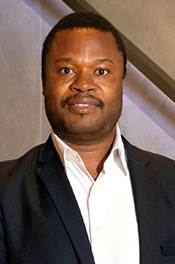 |
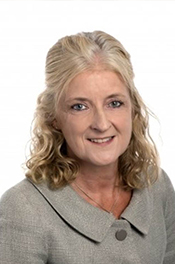 |
|
Dr Theo Mudzunga |
|
Dr Annette Doherty |
Dr. Theo Mudzunga holds a PhD in Organic Chemistry from the University of Cape Town and completed a Post-Doctoral Research Fellowship at the University of the Witwatersrand. With nearly two decades of experience in the petrochemical industry, Theo currently serves as Vice President for the Fundamental Science Research Department in the Research and Technology (R&T) division at Sasol – an international integrated Chemicals and Energy company. |
|
Annette has 35 years of international experience working within the pharmaceutical sector, including at Warner-Lambert, Pfizer and most recently GSK where she was Senior Vice President, Global Head of Product Development and Clinical Supply. She has been directly involved in the research, development and launch of over 30 new medicines in respiratory, infectious diseases, cancer and inflammatory conditions. |
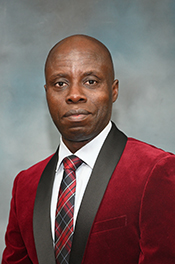
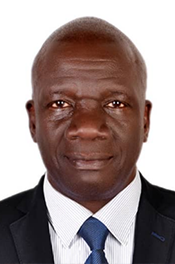
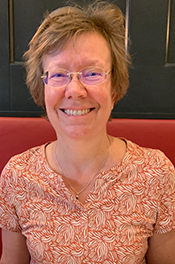
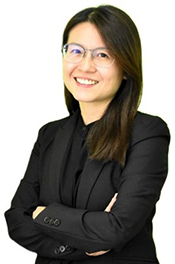
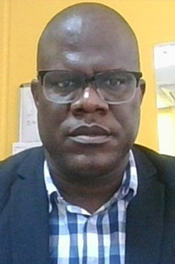
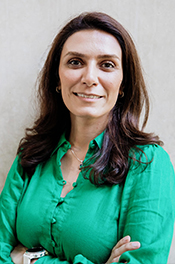
.jpg)
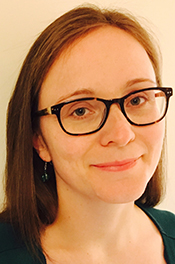
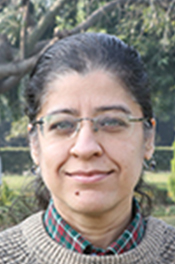
.jpg)
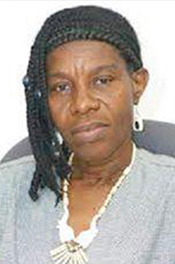
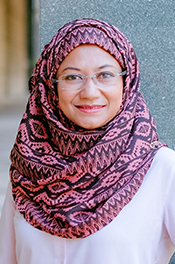
.jpg)
